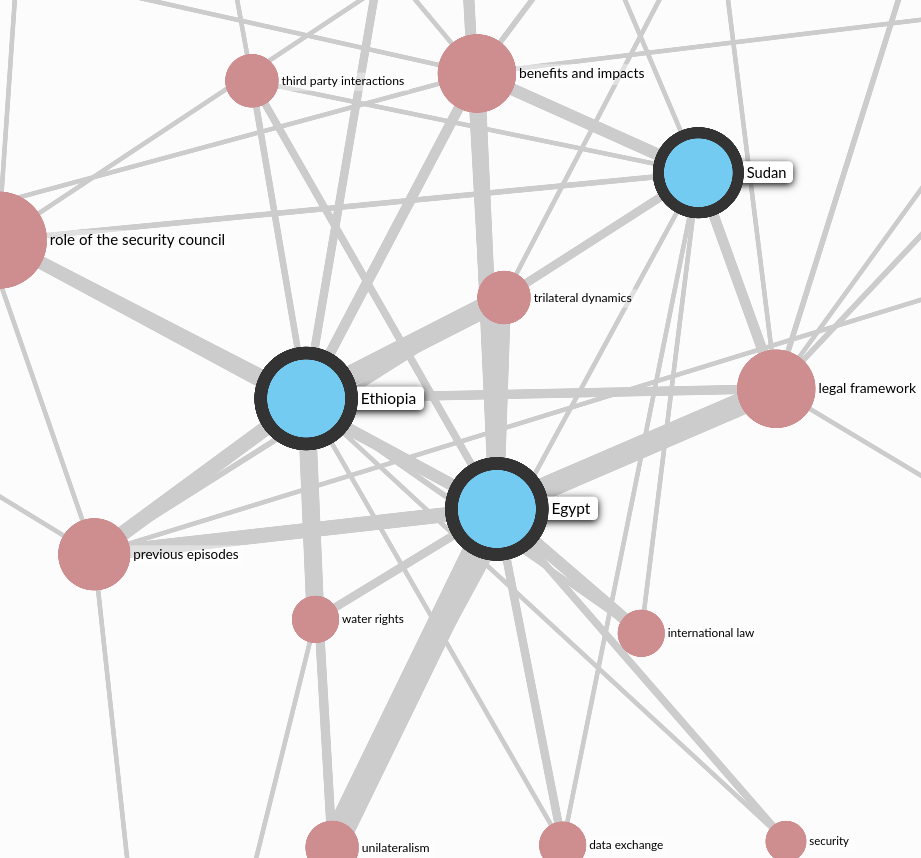Controvery mapping
The Grand Ethiopian Renaissance Dam (GERD) has been a topic of ongoing deliberation, negotiations, and dispute between Egypt, Ethiopia, and Sudan in the Nile Basin. The interplay revolved around the issues pertaining to GERD's construction and operation. The Agreement on the Declaration of Principles (DoP) on the GERD, signed in 2015, provided the basis to negotiate the GERD's filling and annual operation. Following the status quo between 2015 and 2019, the United States of America (US) and the World Bank facilitated a new round of negotiations, but with no success. These negotiations turned into a dispute after Ethiopia announced on June 2020 that it had started filling the GERD reservoir.
During this process, Egypt decided to appeal to the United Nations Security Council (UNSC) on May 2020, calling for the international community to “encourage Ethiopia to accept the agreement” proposed by the US.
The GERD discussions held at the UNSC involved two sessions (on June 2020 and July 2021), and a series of letters were exchanged between the three riparians and the UNSC. In these letters, the riparians explained their positions and perspectives. From these letters, some key narratives emerged:
1. International and regional negotiation processes
1. International and regional negotiation processes
The three riparians had varied standpoints during the UNSC negotiations: Egypt and Sudan argued that the UNSC was a relevant forum as the GERD was a 'threat' to international peace and security; Ethiopia argued the opposite as Egypt attempted to 'internationalise' the regional project to exert pressure.
In parallel to the UNSC discussions, the African Union (AU) sponsored a series of negotiations on the GERD, aiming to reach an agreement on the outstanding issues regarding the filling and operation of the dam. Under the spirit of “African solutions to Africa’s problems”, the AU facilitated negotiations from June 2020, first under the chairmanship of South Africa and then the Democratic Republic of Congo. However, after failing to resolve the outstanding issues under the auspices of the AU, Sudan and Egypt wanted to “expand the negotiation umbrella” by establishing a negotiation mechanism by forming an international quartet that included the United States, United Nations, European Union and African Union. However, Ethiopia rejected this and adhered to AU-brokered negotiations only, emphasising regionalisation. Months of endless attempts by South Africa, as AU head in 2020, to broker a deal to end the negotiation stalemate have failed. Egypt and Sudan continued their effort to internationalise the GERD negotiations, making GERD a security and peace issue beyond Africa.
During the discussions held at the UNSC, the other members' interventions focused on the African Union's role in the ongoing GERD negotiations, as they deemed it the most appropriate forum for resolving this regional issue.
2. Divergent perspectives on the GERD 'drama'
The interplay between the three ‘protagonists’ (Egypt, Ethiopia, and Sudan) and the UNSC members focused on topics of unilateralism, water rights, international law, and benefits and impacts.
The key controversy between the three riparian is linked to the nature of the legal framework for the GERD: should it be comprehensive or phased; should it regulate the complete process of filling and operating the dam, or just the filling and mechanisms of data exchange; should it be legally binding, or just by suggestive guidelines and rules?
The network shows that Egypt and Ethiopia are at loggerheads with each other based on historical (colonial according to Ethiopia) water treaties, primarily the 1902 Treaty on Frontiers between Anglo-Egyptian Sudan, Ethiopia & Eritrea, the 1929 Exchange of Notes regarding the Use of the Waters of the River Nile for Irrigation, and the 1959 Agreement between Egypt and Sudan for the Full Utilisation of the Nile Waters, all used for allocating water rights. We can observe that conversations between Egypt and Ethiopia are connected to unilateralism and previous episodes. On the contrary, Sudan is focused more on the legal framework and benefits and impacts, suggesting that agreeing on an appropriate framework could lead to equitable benefits without inflicting significant harm, and potentially reducing conflicts between Egypt and Ethiopia.
2. Divergent perspectives on the GERD 'drama'
3. The tones of discord
3. The tones of discord
The disagreements mentioned above can be explained based on the tones used by the three riparians in the letters. For instance, Egypt accuses Ethiopia of unilateral actions and not wanting to negotiate a “fair and balanced agreement”. Ethiopia accuses Egypt of internationalising the GERD to pressure Ethiopia into accepting the status quo, and Sudan accuses Ethiopia of rejecting all negotiation proposals.
The networks also show that the three protagonists were assertive, concerned, and boastful when discussing the GERD and putting forward their arguments and positions. Most accusations were about unilateral actions, water rights, the dynamics (between Egypt and Ethiopia), and past negotiations. This is because the GERD ‘drama’ did not start in 2020, being a decade-long power interplay. Even if the riparians acknowledge progress in the negotiations throughout the years, they keep viewing each other's actions as obstructionist or unconstructive.
Apart from the three protagonists, the members of the UNSC discussed the GERD in optimistic and suggestive tones, as they argued the differences between the three riparians could be solved through dialogue and consultation, especially when “more than 90% of the issues have been resolved”.
4. Different framings of the GERD ‘drama’
The three protagonists use similar GERD ‘drama’ framings, referring to both technical (GERD capacity, filling, and operation, data exchange) and political (peace and security, negotiations, cooperation, rights, international law) concepts.
The members, however, framed the GERD 'drama' differently. Some members highlighted the potential positive outcomes of the GERD (win-win, regional integration, opportunity, dialogue, and respect), whilst others emphasised the process of resolving the GERD ‘drama’ (African solutions, mediation, compromise, dispute resolution, observers).


